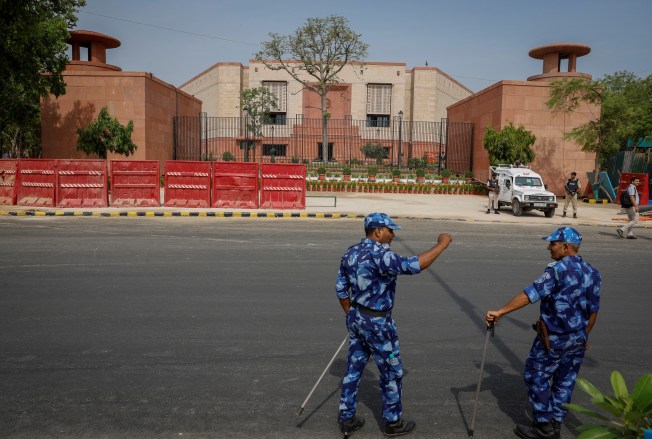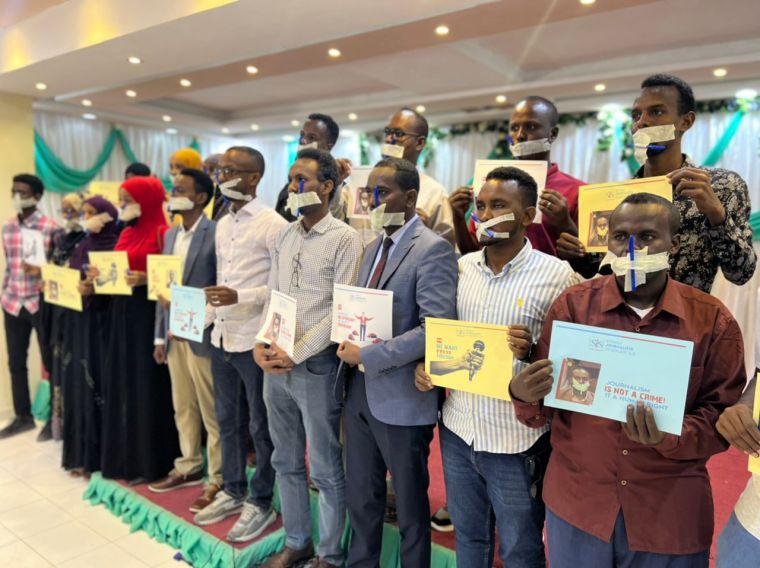The Torch is a weekly newsletter from the Committee to Protect Journalists that brings you the latest press freedom and journalist safety news from around the world. Subscribe here.
Media sites from at least six countries — Somalia, Kosovo, Nigeria, Kyrgyzstan, the Philippines, and Turkmenistan — have faced distributed denial-of-service (DDoS) attacks using U.S. company RayoByte’s services over the last two years. Such cyberattacks often take place alongside other threats to journalists’ safety and press freedom.
Headquartered in Nebraska, RayoByte is one of many companies that sells clients access to Internet Protocol (IP) addresses, unique numbers assigned to internet-connected devices, for “scraping,” a method for extracting large amounts of data from websites. When IP requests are directed quickly and en masse toward a specific site in order to overwhelm it and knock it offline, this constitutes a DDoS attack.
The website of the Somali Journalists Syndicate (SJS) was knocked offline in a DDoS attack in early August. Days later, authorities arrested SJS staff member Mohamed Ibrahim Osman Bulbul. Later cyberattacks involved RayoByte’s tools, said Qurium, a nonprofit that began hosting and defending SJS.
Similar DDoS attacks began almost immediately after Kosovo-based news site Nacionale began publishing in March 2022. Alongside ongoing cyberattacks, Nacionale’s staff were recently physically attacked on the job.
Qurium’s technical director Tord Lundström wants RayoByte and other companies that profit off the sale of proxy and VPN services to do more to address the fact that attackers access such tools to target media sites.
🗯️ “You can have technology providers doing appropriate things to protect their users and others at the same time as they build their service in a way that protects privacy,” Gabe Rottman of Reporters Committee for Freedom of the Press told CPJ’s Jonathan Rozen. “If… you become aware of bad actors doing bad things, notify the authorities, stop them from using your service.”
💡 Read CPJ’s new feature about the cyberattacks
🔎 Explore CPJ’s website to read about other cases of DDoS attacks against outlets conducting critical journalism
⚠️ Protect your site from a DDoS attack by registering it with a service such as Project Shield, and review CPJ’s digital safety kit for additional digital security advice
- Reporters in Haiti flee gang violence surge in capital’s Carrefour Feuilles neighborhood; radio journalist’s home destroyed in arson attack
- Myanmar Now photojournalist Sai Zaw Thaike sentenced to 20 years in prison on multiple charges
- Iran blocks Entekhab’s website and social media over report criticizing foreign policy
- Tunisian authorities jail journalist Khalifa Guesmi over national security charge
- DRC immigration officers attack journalist Soleil Ntumba Mufike to stop eviction coverage
- Football fans attack, injure Malawi reporter Smart Chalika
- Three more journalists arrested under Ethiopia’s state of emergency
- Belarusian court sentences journalist Larysa Shchyrakova to three and a half years in prison
- Two exiled Russian journalists sentenced to 11 years for disseminating “fake” news on Ukraine war
- Turkish journalist Mehmet Karakeçili beaten, Hale Gönültaş threatened
Spotlight

Ahead of the G20 New Delhi summit this weekend, CPJ’s Asia Program Coordinator Beh Lih Yi wrote in The Diplomat today about how the worsening press freedom situation in India undermines its reputation as the world’s largest democracy and president of the G20.
She writes: “As the world’s leaders embark on New Delhi, it is imperative that G-20 members — many of which purport to support a free press — call on India to course correct and abandon mounting legislation that threatens press freedom.”
⚡️ Read the full op-ed in The Diplomat.
In late August, CPJ urged Indian lawmakers to review three bills that threaten the independence of the press, and asked the government to withdraw and significantly amend its new data protection law. CPJ has covered the increasing number of social media accounts belonging to media outlets that have been blocked by authorities in the last month.
📖 Read CPJ’s coverage of additional press freedom violations in India on our website.
📣 In May, CPJ called for the release of four imprisoned journalists in Kashmir ahead of the G20 meeting on tourism in Kashmir.
What we are reading (and listening to)
- 🎙️ Frontier Myanmar – A Newsroom in Exile — Keith Kam, BFM
- Bill Richardson, Champion of Americans Held Overseas, Dies at 75 — Sam Roberts, The New York Times
- Remembering Jeff German: A year after slaying, immeasurable impact of RJ reporter’s work lives on —Katelyn Newberg, Las Vegas Review-Journal
- A new EU law, and the battle to protect Europe’s journalists — Sigrid Melchior and Harald Schumann, EUobserver
- Internet addresses that Africa’s registry tried to seize used in cyberattack on African journalists — Jan Vermeulen, MyBroadband
Do you have an Amazon Alexa-enabled device? Enable CPJ's flash briefing skill to stay up to date with the latest press freedom news from around the world.
